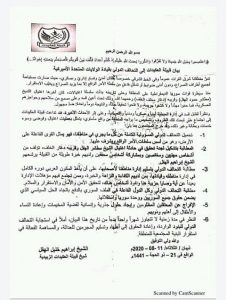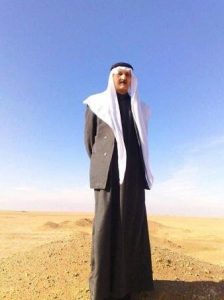Introduction
Several areas of the eastern countryside of Deir Ezzor province have witnessed security developments over the past few weeks, with SDF incursions into several towns, the arrest of dozens of civilians, the imposition of a curfew. Moreover, assassinations of tribal leaders and notables in the region took place, which has exacerbated the situation in the eastern countryside where there is tension due to the ongoing security chaos since the SDF, in cooperation with the international coalition, was able to eliminate ISIS there in 2017.
On July 16th, 2020, the SDF announced the start of the second phase of Operation “Deterring Terrorism” as part of a security campaign aimed, according to the announcement, at pursuing ISIS cells in the province and restoring safety and stability to the target area. The security campaign focused on the towns of the eastern countryside, namely Al-Shuhail, Al-Bsaira, Al-Sabha, Al-Bariha, and Al-Zir.
A well-informed source of the Syrian Democratic Forces, who preferred not to be named for personal reasons, confirmed to Justice for Life that “in addition to the pursuit of ISIS cells, the presence of sleeper cells of the Syrian government and its allies in the targeted areas is behind this campaign, and that about 20 people who are connected to the Syrian government have already been arrested.”
Furthermore, another witness told Justice for Life that “ten days before the security campaign, a delegation of notables from the eastern countryside of Deir Ezzor, including Mahmoud Al-Nofal, went to the leadership of the Syrian Democratic Forces represented by Mazlum Abdi, the commander of these forces, where the delegation demanded to allocate part of the oil revenues to improve services in the region, and to abolish the new schools curriculum, and to strengthen the role of the residents of the region in managing their areas. These demands were rejected and threatened, leading to verbal altercations between the two sides of the meeting.”
Details of the Incursion
Justice for Life has documented numerous human rights violations committed by the SDF during this campaign. According to the organization, through testimonies of five witnesses from the towns of Al-Shuhail and Al-Bsaira, since the evening of Thursday ( July 16th ) the SDF has begun to strengthen its presence at checkpoints in the towns of Al-Shuhail and Al-Bsaira, closed river crossings, and transported river ferries from Al-Shuhail area to the military base in Al-Omar oil field.
On the morning of Friday, July 17th , a large convoy of anti-terrorist forces (HAT) and (YPG), as well as the Asayish forces and commandos of the Syrian Democratic Forces, entered the eastern countryside, coinciding with the flight of international coalition warplanes over the area. The curfew was declared as of Friday evening, with anyone who violates the ban warned of “arrest or shooting.” The curfew caused “bread bakeries to stop working, power and water outages, and a shortage of basic materials of infant milk, vegetables and the heavily used “ice” in the summer. The ban was then partially lifted on Sunday, July 19th and Monday, July 20th , allowing only women to go out to buy bread after the bakeries partially returned to work”.
The security campaign resulted in the arrest of dozens of people in the area, and there were random arrests, including men, elderly and children, during which detainees were “beaten and verbally insulted”, witnesses said.
According to Justice for Life, about 40 people were arrested in the cities of Al-Bsaira and Al-Shuhail alone, including Mahmoud Al-Nofal, head of the Civil Council in the city of Al-Shuhail, where he was detained for two hours before being released. In addition, more than 20 arrests were documented in the village of Jadid Akidat. Some of the detainees were later released.
Moreover, the forces involved in the incursion trespassed on civilian property, as shops selling food belonging to Ismail al-Khalid were robbed after he and several of his relatives were arrested. In addition, many houses were seized and used as headquarters during the security campaign, such as the house of Mohammed al-Faraj in the city of Al-Shuhail. Additionally, livestock belonging to civilians were stolen.
Assassinations of Tribal Leaders
On the morning of Monday, July 31st , 2020, unidentified gunmen riding motorcycles opened fire on Sheikh Ali Al-Sulaiman Al-Alwais as he was on his way to perform Eid prayers at the village mosque, causing his immediate death.
Sheikh Al-Wais, the Mukhtr of the village of Al-Dahla, and a figure of al-Burahma clan of the Al-Bakara tribe, who are considered to be among the most important leaders of Deir Ezzor and those who contribute to resolving disputes among the clans. He has no political affiliation.
Sheikh Ali Al-Sulieman Al-Wais – Credit: Social Media – Verified by JFL
On August 2nd , 2020, in the same manner, Sheikh Mutasher Hmoud Al-Jad’an Al-Hifil, one of the most prominent figures of the Al-Akidat tribe, was killed, in addition to injuring the Sheikh of the tribe,Ibrahim Khalil Abboud al-Jad’an Al-Hifil, who was with Sheikh Mutasher at the time of the attack.
Sheikh Mutasher Hmoud Al-Jad’an Al-Hifil – Credit: Social Media – Verified by JFL
The Populations Indignation
These assassinations have had a major impact on the people of the eastern countryside of Deir Ezzor who are already suffering from unprecedented security lapses, chaos and instability. The region has recently witnessed numerous robberies, kidnappings and killings, as well as armed robberies and fighting among residents in some areas, all without the Syrian Democratic Forces fulfilling their duties to provide minimum stability and security as the forces in control of the area, “prompting residents in many areas to come up with angry demonstrations at those responsible for the death of Sheikh Al-Hifil.The Syrian Democratic Forces responded to these demonstrations with a fire that injured some demonstrators in the town of Al-Hawaij, where anger escalated, the demonstrators burned down the headquarters of the Syrian Democratic Forces and expelled their forces from the town”.
The Syrian Democratic Forces sent military reinforcements, including elements and vehicles, towards the areas of Theeban, Al-Sabha and Al-Hawaij, to stop protests and disperse protesters, imposed a curfew, and carried out a dawn arrest campaign on Thursday, August 6th, in the town of Al-Shuhail and arrested several residents of the town.
Against this backdrop, and at the invitation of the tribe Skeikh of Akidat, the tribal leaders of the held a meeting on Tuesday, August 11th , in the town of Theeban, east of Deir Ezzor, accordingly, issued a statement holding the US-led international coalition responsible for the security chaos and instability in Deir Ezzor, and called on it to form an independent and professional commission of inquiry to investigate the the assassination of Sheikh Mutasher Al-Hifil. The statement also demanded the handover of the administration of Deir Ezzor to its populations who are competent, experienced and fair, providing that the Arab component shall take its full role in the administration of the region. It also demanded the release of the detainees and pushing forward a political solution that guarantees the rights of all Syrians and the unity and independence of Syrian territory, the international coalition has a one-month deadline to achieve these demands. 
The statement issued by Al-Akidat Tribe – Source: social media – these demands are confirmed by voice recording.
Up to the time of writing this report, no party had claimed the responsibility of these assassinations, while the SDF security services had arrested a citizen, Abdul Razzaq Nawaf al-Quti, saying that his arrest was in connection with the assassination of tribal leaders and figures. The media outlets reported a confession by al-Quti that Syrian intelligence, specifically the political security branch in Hasakeh governorate, had formed an “assassination cell” targeting Sheikhs, tribal leaders, well-known figures and heads of local councils in the Deir Ezzor area.
Conclusion
With the testimonies and information obtained by Justice for Life, the state of insecurity and instability directly affects the lives and interests of the locals. The SDF is also responsible for its inability to control the security situation, as well as for violations committed by its forces during its security campaigns and inside prisons. The Autonomous Administration has not responded to the demands of the populations, which they have repeatedly expressed through meetings and demonstrations, and has not kept up with its repeated promises for a more transparent administration and the application of the principle of accountability.













